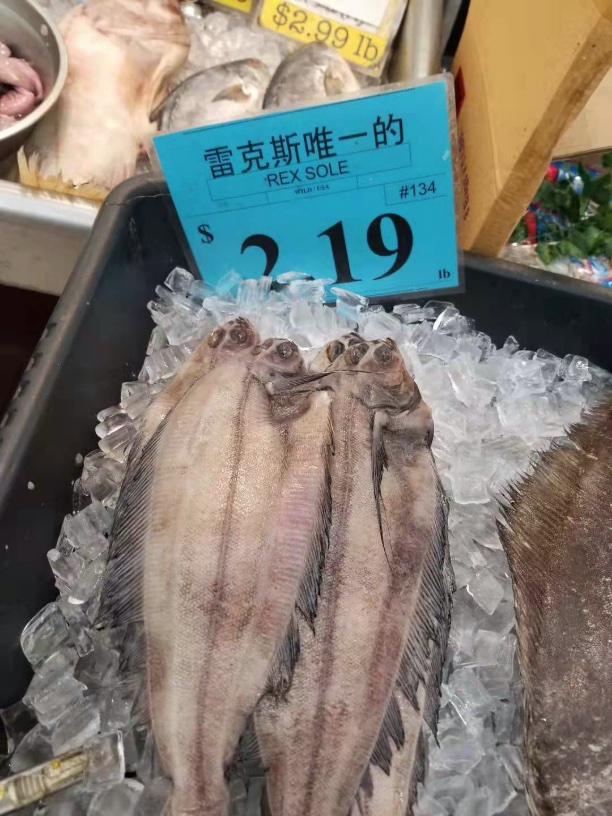The only rex
« previous post | next post »
From a Chinese fish market:
The Chinese label says:
léikèsī wéiyīde
雷克斯唯一的
"Rex's only" (Google Translate; Baidu Fanyi); "Rex's only one" (Bing Translator)
Going the other way, starting with "Rex Sole", we get:
Léikèsī jiǎodǐ 雷克斯脚底 ("the sole of Rex's [foot]" (Google Translate)
Léikèsī xiédǐ 雷克斯鞋底 ("the sole of Rex's [shoe]" (Baidu Fanyi; Bing Translator)
Just so we're all on the same page when it comes to what a "rex sole" (fish) really is:
The rex sole (Glyptocephalus zachirus) is a flatfish of the family Pleuronectidae. Locally, it may also be known as a witch or threadfin sole (due to the filamentous pelvic fin on the eyed surface). It is a demersal fish that lives in temperate waters on sand or mud bottoms at depths of up to 900 metres (3,000 ft), though it is most commonly found between 61 and 500 metres (200 and 1,640 ft). Its native habitat is the northern Pacific, from Baja California in Mexico up the coasts of the United States, British Columbia and Alaska, across the Bering Sea to the coast of Russia and the Sea of Japan. It is slow-growing, reaching up to 60 centimetres (24 in) in length (though its average length is 36 centimetres (14 in)), and it can weigh up to 2.0 kilograms (4.4 lb). Maximum reported lifespan is 24 years.
(source)
The Chinese name for the rex sole is Měizhōu měishǒu dié 美洲美首鰈 (source), which may also be translated as "American flounder".
Selected readings
- "Goldensmell salt and milkfish balls" (6/29/15)
- "'Vegetable English' vs. 'Korea Fish' in Taiwan's presidential election" (1/14/20)
- "Franco-Croatian Squid in pepper sauce" (3/12/09)
- "Japanesespanishmackerel" (11/13/13)
- "Living fossils: Taiwan tea and salmon" (12/31/19)
- "Shampoo salmon" (2/10/14)
- "Thai fish estimates sea thicket is angry" (1/24/13)
[Thanks to Yuanfei Wang]

Bathrobe said,
September 30, 2021 @ 8:04 am
This is the opposite of your normal posts, which are hilarious warped mistranslations from Chinese into English. This one is a hilarious warped mistranslation from English into Chinese.
Victor Mair said,
September 30, 2021 @ 9:15 am
Right, Bathrobe. Good point!
Matt Sayler said,
September 30, 2021 @ 12:23 pm
"a Chinese fish market" … in the US, I assume, based on the units of currency and weight?
Philip Taylor said,
September 30, 2021 @ 1:31 pm
"though it is most commonly found between 61 and 500 metres (200 and 1,640 ft)". Very odd and inconsistent rounding. Why not "60 and 500 metres" or "200 and 1,700 ft" ?
Andrew Usher said,
September 30, 2021 @ 6:56 pm
Many (most?) people don't seem to get proper rounding, though. And considering it's Wikipedia, it's quite possible not all the numbers came from the same person. Since it is obviously not at all precise in either system, I'd put "60 to 500 m (200 to 1,600 ft)".
The obvious failing in this translation is the lack of awareness that 'rex sole' is a fish. Any human or machine translator unaware of that (as was apparently the case here) is going to come up with nonsense.
k_over_hbarc at yahoo dot com
Anthony said,
September 30, 2021 @ 10:44 pm
I wonder how the chess term "solus rex" translates.
Victor Mair said,
September 30, 2021 @ 11:14 pm
From Jeroen Wiedenhof:
The Rex Sole post was a nice way to introduce my Chinese linguistics students to Language Log; details are at <https://www.wiedenhof.nl/ul/tk2-2122.htm#week04ust>.
(in case you check this with online translation tools, these may not reveal the pun in the tag line "Spreken in tongen?", where Dutch tong means both 'tongue' and 'sole' ;-)
Andrew Usher said,
October 2, 2021 @ 7:32 pm
Actually, 'rex solus' is not a chess term, but a chess problem term. Those are now different fields, meaning that chess players would not use 'rex solus' even where it fits (the Latin words are obvious). Now how, if at all, is the fish name related?